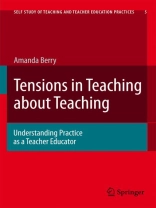This series in Teacher Education: Self-study of Teacher Education Practices (S-STEP) has been created in order to offer clear and strong examples of self-study of teaching and teacher education practices. It explicitly values the work of teachers and teacher educators and through the research of their practice, offers insights into new ways of encouraging educational change. The series is designed to complement the Inter- tional Handbook of Self-study of Teaching and Teacher Education practices (Loughran, Hamilton, La Boskey, & Russell, 2004) and as such, helps to further define this important field of teaching and research. Self-study of teaching and teacher education practices has become an important ‘way in’to better understanding the complex world of teaching and learning about teaching. The questions, issues and concerns, of teacher educators in and of their own practice are dramatically different to those raised by observers of the field. Hence, self-study can be seen as an invitation to teacher educators to more meani- fully link research and practice in ways that matter for their pedagogy and, as a consequence, their students’learning about pedagogy.
Innehållsförteckning
Contexts Of The Study.- Beginning To Research My Practice.- Teacher Educators Studying Their Work.- Developing A Research Approach.- Tensions as a Framework for Learning About Practice in Teacher Education.- Exploring The Tensions Of Practice.- Telling and Growth.- Confidence and Uncertainty.- Action and Intent.- Safety and Challenge.- Planning and Being Responsive.- Valuing and Reconstructing Experience.- Revisiting and Summarising The Tensions.- Learning From Teaching About Teaching.- Becoming a Teacher Educator.












